Related Research Articles
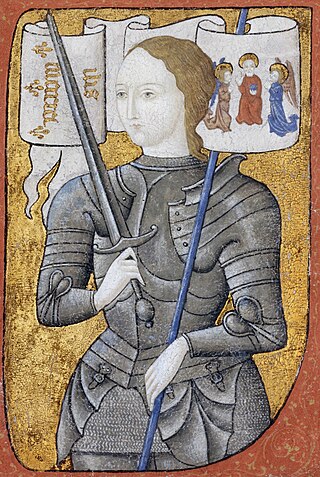
Joan of Arc is a patron saint of France, honored as a defender of the French nation for her role in the siege of Orléans and her insistence on the coronation of Charles VII of France during the Hundred Years' War. Claiming to be acting under divine guidance, she became a military leader who transcended gender roles and gained recognition as a savior of France.

The siege of Orléans marked a turning point of the Hundred Years' War between France and England. The siege took place at the pinnacle of English power during the later stages of the war, but was repulsed by French forces inspired by the arrival of Joan of Arc. The French would then regain the initiative in the conflict and began to recapture territories previously occupied by the English.
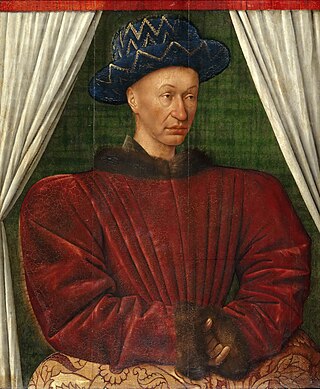
Charles VII, called the Victorious or the Well-Served, was King of France from 1422 to his death in 1461. His reign saw the end of the Hundred Years' War and a de facto end of the English claims to the French throne.
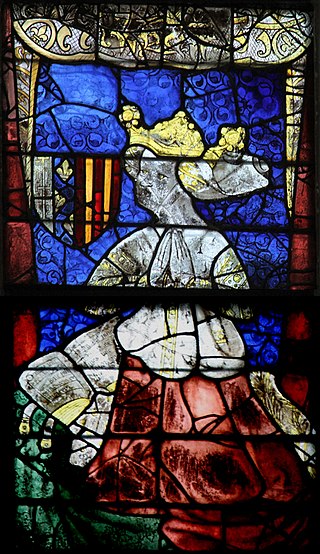
Yolande of Aragon was Duchess of Anjou and Countess of Provence by marriage, who acted as regent of Provence during the minority of her son. Yolande played a crucial role in the struggles between France and England, influencing events such as the financing of Joan of Arc's army in 1429 that helped tip the balance in favour of the French. She was also known as Yolanda de Aragón and Violant d'Aragó. Tradition holds that she commissioned the famous Rohan Hours.
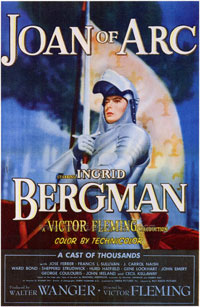
Joan of Arc is a 1948 American epic historical drama film directed by Victor Fleming, and starring Ingrid Bergman as the eponymous French religious icon and war heroine. It was produced by Walter Wanger and is based on Maxwell Anderson's successful Broadway play Joan of Lorraine, which also starred Bergman, and was adapted for the screen by Anderson himself, in collaboration with Andrew Solt. It is the last film Fleming directed before his death in 1949.

Saint Joan is a 1957 historical drama film adapted from the 1923 George Bernard Shaw play of the same title about the life of Joan of Arc. The restructured screenplay by Graham Greene, directed by Otto Preminger, begins with the play's last scene, which then becomes the springboard for a long flashback, from which the main story is told. At the end of the flashback, the film then returns to the play's final scene, which then continues through to the end.
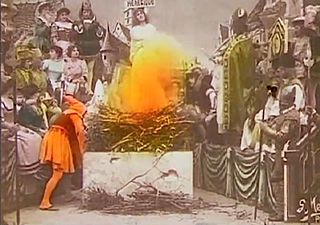
Joan of Arc is a 1900 French silent film directed by Georges Méliès, based on the life of Joan of Arc.
Robert de Baudricourt, Seigneur de Baudricourt, Blaise, Buxy and Sorcy was a minor figure of 15th century French nobility. The son of the Chamberlain of the Duke of Bar, he is notable for his association with Joan of Arc.

Baudricourt is a commune in the Vosges department in Grand Est in northeastern France.
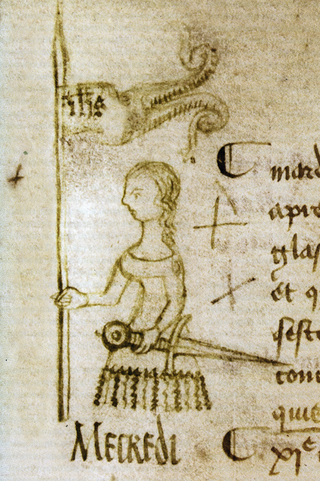
There are a number of revisionist theories about Joan of Arc which contradict the established account of her life. These include the theories she was an illegitimate royal child; that she was not burned at the stake; that most of her story is a fabrication; and that she escaped death at the stake. These theories have not gained significant acceptance among academic historians.

Joan of Arc is a 1999 Canadian two-part television miniseries about the 15th-century Catholic saint of the same name. The miniseries stars Leelee Sobieski as Saint Joan. A joint production of the Canadian Broadcasting Corporation and Alliance Atlantis Communications, it was shown internationally in 1999.

The Trial of Joan of Arc was a 15th century legal proceeding against Joan of Arc, a French military leader under Charles VII during the Hundred Years' War. During the siege of Compiègne in 1430, she was captured by Burgundian forces and subsequently sold to their English allies. She was prosecuted by a pro-English church court at Rouen, Normandy, in 1431. The court found her guilty of heresy and she was burned at the stake. The verdict was later nullified at Joan's rehabilitation trial, which was overseen by the Inquisitor-General, Jean Bréhal, in 1456. Considered a French national heroine, she was declared a saint by the Roman Catholic Church in 1920. The trial is one of the most famous in history, becoming the subject of many books and films.

Jean d'Aulon (1390–1458) was a French knight and lord best known for serving alongside Jeanne d'Arc as her soldier, steward, bodyguard, and squire. Some sources incorrectly attribute the role of d'Arc's bodyguard to Gilles de Rais. d'Aulon was an avid and detailed journaler and his records, considered to be honest and straightforward, set the foundation for what we know about Jeanne d'Arc, including her apparent amenorrhea.
Jean de Metz was a French nobleman who is known primarily for his role in the exploits of Joan of Arc.

The conviction of Joan of Arc in 1431 was posthumously investigated on appeal in the 1450s by Inquisitor-General Jean Bréhal at the request of Joan's surviving family—her mother Isabelle Romée and two of her brothers, Jean and Pierre. The appeal was authorized by Pope Callixtus III.

French history has been the basis of plays in the English-speaking theatre since the English Renaissance theatre.

Aveline de Grandpré is a fictional character in Ubisoft's Assassin's Creed video game franchise. She first appears as the protagonist of Assassin's Creed III: Liberation, a spin-off installment originally released for the PlayStation Vita in October 2012. She has also featured in a titular expansion pack for the 2013 title Assassin's Creed IV: Black Flag, as well as other spin-off media of the franchise. In both of her video game appearances, she is portrayed by actress Amber Goldfarb through performance capture.

Edward James Kenway is a fictional character in Ubisoft's Assassin's Creed video game franchise. He was introduced as a supporting character in Assassin's Creed: Forsaken, a companion novel to the 2012 video game Assassin's Creed III. He subsequently appeared as the protagonist of the 2013 video game, Assassin's Creed IV: Black Flag, and its novelization, Assassin's Creed: Black Flag. In the former, he is portrayed by Welsh actor Matt Ryan through performance capture. Since Black Flag's release, the character has made further appearances in several other works within the franchise.
Joan the Maid is a 1994 French historical film directed by Jacques Rivette. Chronicling the life of Joan of Arc from the French perspective, it was released in two parts: Joan the Maid, Part 1: The Battles and Joan the Maid, Part 2: The Prisons.
References
- 1 2 Colrat, Jean-Claude. "Jean de Metz et Bertrand de Poulengy". Joan of Arc's Companions in Arms. Archived from the original on 2018-01-28. Retrieved 2018-04-16.
- ↑ Lynch, Denis. "The Life-Story of the Maid of Orleans". Saint Joan of Arc Center. Retrieved 28 May 2019.